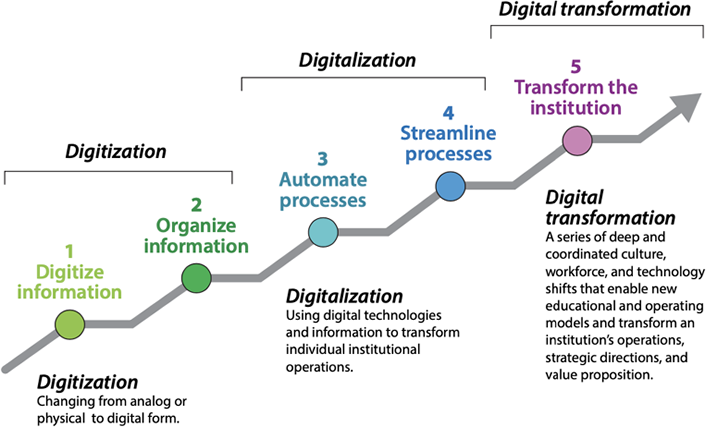Institutional responses to the coronavirus pandemic have provided CIOs with an opportunity to talk with other campus leaders about digital transformation, and that conversation can start with a better understanding of digitization, digitalization, and digital transformation.

Digital transformation is a series of deep and coordinated culture, workforce, and technology shifts that enable new educational and operating models and transform an institution's business model, strategic directions, and value proposition.1
Thanks to the coronavirus pandemic, colleges and universities are experiencing transformation right now—regardless of whether they were prepared for change or had a transformation strategy in place. With so much change suddenly under way, and with so much of it dependent on technology, IT leaders are in a position to help connect the dots between the steps that are being taken in response to the pandemic and the meaning digital transformation holds for institutions. Dx can make institutions more resilient, flexible, and relevant as they face an array of increasingly difficult challenges that include responding to the pandemic and ongoing issues such as declining student enrollment, growing public skepticism, and skyrocketing student debt.
Crucial to the idea of Dx is that it involves a deep, coordinated effort aimed at institutional transformation in areas such as strategic direction, value proposition, or business model.2 Simply putting courses online or implementing a more modern enterprise system isn't digital transformation. To be considered Dx, those pieces would need to be included as part of a larger institutional transformation effort.
It's easy to mistake the regularly increasing presence of digital information and processes as digital transformation. Higher education institutions have been moving everything, from payroll to classes, online for many years. Efforts at making information and processes digital may trigger or contribute to Dx, but by themselves they are not Dx. These efforts utilize digital technology, but they lack the institutional transformative work involved in digital transformation.
It's helpful for CIOs to consider the three Ds—digitization, digitalization, and digital transformation—when striving to better understand Dx and when discussing Dx with other campus leaders (figure 1).

- We digitize information. Digitization is the transition from an analog to a digital form. For example, we digitize paper records for archiving and retrieval. We put information online that wasn't online before.
- We digitalize processes. Digitalization describes using digital technologies and information to transform individual institutional operations (such as payroll, procurement, research administration, and even course delivery). The missing piece in digitalization, the thing that keeps it from being Dx, is the intentionality of a coordinated effort aimed at institutional transformation.
- We digitally transform institutions. Digital transformation is an institutional strategy to transform the strategic direction or value proposition of the college or university. Dx involves deep and coordinated shifts in culture, workforce, and technology. Institutions will likely need to have gone through significant digitization and digitalization work for digital transformation efforts to be successful.
How an institution approaches Dx is highly dependent on its culture, values, and strategic priorities. A college or university could elect to begin at the institutional level at the very outset, or it could start its Dx journey with a series of "local" transformations of individual campus organizations. A campus IT organization, for example, could transform itself not only to better serve the institution but also to set an example and enable other campus units to undertake their own transformations. In this way, transformations at the campus-organization level can act as stepping-stones and build momentum toward transformation at the institutional level.
Colleges and universities are facing significant challenges right now, and much is at stake. Institutional leaders know that transformational change is needed, and as a result, there's an opportunity in this challenging time for institutions to advance their Dx efforts. The CIO has an important role to play. As Susan Grajek, EDUCAUSE vice president for communities and research, writes, "The role of the CIO has never been more significant to the institution. CIOs can help their institutions develop and attain digital transformation objectives if institutional leaders are ready to involve them at the most strategic levels."3 Institutional responses to the pandemic have shined a spotlight on technology as a critical piece of institutional strategy and provided CIOs with an opportunity to engage their institutions in conversations about digital transformation. And those conversations can start with a better understanding of the three Ds—digitization, digitalization, and digital transformation.
For more on enterprise IT issues and leadership perspectives in higher education, please visit the EDUCAUSE Review Enterprise Connections blog as well as the Enterprise IT Program web page.
Notes
- Malcolm Brown, Betsy Reinitz, and Karen Wetzel, "Digital Transformation Signals: Is Your Institution on the Journey?" Enterprise Connections (blog), EDUCAUSE Review, May 12, 2020. ↩
- Ibid. ↩
- Susan Grajek and the 2019–2020 EDUCAUSE IT Issues Panel, "Top 10 IT Issues, 2020: The Drive to Digital Transformation Begins," EDUCAUSE Review Special Report (January 27, 2020). ↩
Betsy Tippens Reinitz is the Director of the Enterprise IT Program at EDUCAUSE.
© 2020 Betsy Tippens Reinitz. The text of this work is licensed under a Creative Commons BY-NC-ND 4.0 International License.
